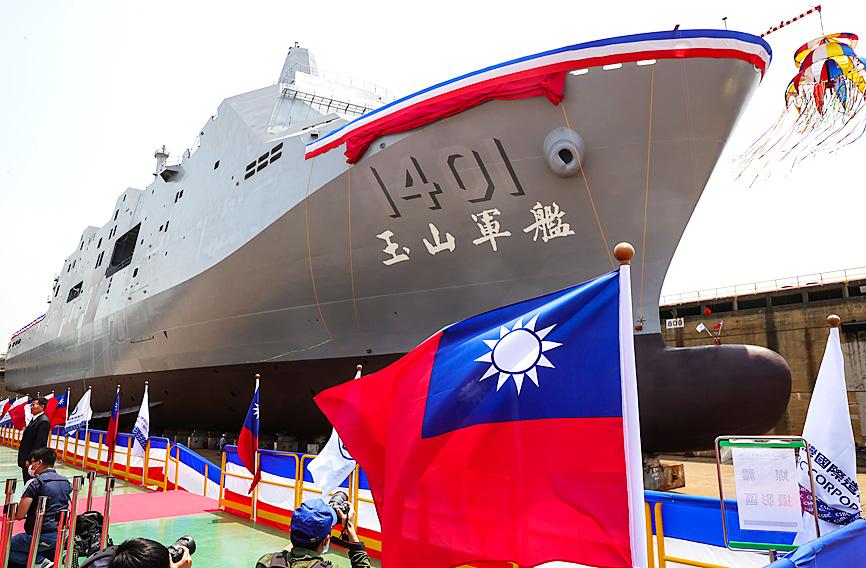A Taiwan-made Yushan landing platform dock (LPD) is scheduled to be delivered to the navy as early as September if its soon-to-be-launched sea trial proves to be a success, a military source said yesterday.
The 10,600-tonne amphibious multimission vessel is currently docked at a military port undergoing tests to make sure all the newly installed systems work smoothly, the source said, without naming the port.
After completing the static tests, the vessel would then conduct a sea trial to make sure the domestically built LPD can operate safely, the source added.

Photo: CNA
If the sea trial is successful, the vessel could be delivered to the navy in September at the earliest, the source said.
The source also confirmed a report yesterday by the Chinese-language Liberty Times (the sister paper of the Taipei Times) which gave an update on the status of the domestic LPD program.
Christened and launched in April last year, the Yushan is the first of four indigenous LPDs being built by local shipbuilder CSBC Corp, Taiwan (台船) for the navy, but it has yet to be handed over to the military as testing continues.
Once in service, the Yushan, named after Taiwan’s highest peak, would replace the Hsu Hai dock landing ship, which first entered into service with the US Navy as the USS Pensacola in 1971, before being transferred to Taiwan in 1999.
The ship, which is 153m by 23m, has a top speed of 21 knots and a range of 11,265km. It is able to carry several AAV7 amphibious armed personnel carriers and 673 troops.
It can also be fitted with an MK-75 76mm gun, two MK-15 Phalanx close-in weapons systems and two TC-2N missile systems.
The ship has two hangars able to accommodate helicopters.
It would be responsible for transporting supplies and personnel to the nation’s outlying islands, as well as joining humanitarian assistance missions in emergencies, the military said.

CALL FOR SUPPORT: President William Lai called on lawmakers across party lines to ensure the livelihood of Taiwanese and that national security is protected President William Lai (賴清德) yesterday called for bipartisan support for Taiwan’s investment in self-defense capabilities at the christening and launch of two coast guard vessels at CSBC Corp, Taiwan’s (台灣國際造船) shipyard in Kaohsiung. The Taipei (台北) is the fourth and final ship of the Chiayi-class offshore patrol vessels, and the Siraya (西拉雅) is the Coast Guard Administration’s (CGA) first-ever ocean patrol vessel, the government said. The Taipei is the fourth and final ship of the Chiayi-class offshore patrol vessels with a displacement of about 4,000 tonnes, Lai said. This ship class was ordered as a result of former president Tsai Ing-wen’s (蔡英文) 2018

‘SECRETS’: While saying China would not attack during his presidency, Donald Trump declined to say how Washington would respond if Beijing were to take military action US President Donald Trump said that China would not take military action against Taiwan while he is president, as the Chinese leaders “know the consequences.” Trump made the statement during an interview on CBS’ 60 Minutes program that aired on Sunday, a few days after his meeting with Chinese President Xi Jinping (習近平) in South Korea. “He [Xi] has openly said, and his people have openly said at meetings, ‘we would never do anything while President Trump is president,’ because they know the consequences,” Trump said in the interview. However, he repeatedly declined to say exactly how Washington would respond in

WARFARE: All sectors of society should recognize, unite, and collectively resist and condemn Beijing’s cross-border suppression, MAC Minister Chiu Chui-cheng said The number of Taiwanese detained because of legal affairs by Chinese authorities has tripled this year, as Beijing intensified its intimidation and division of Taiwanese by combining lawfare and cognitive warfare, the Mainland Affairs Council (MAC) said yesterday. MAC Minister Chiu Chui-cheng (邱垂正) made the statement in response to questions by Democratic Progressive Party (DPP) Legislator Puma Shen (沈柏洋) about the government’s response to counter Chinese public opinion warfare, lawfare and psychological warfare. Shen said he is also being investigated by China for promoting “Taiwanese independence.” He was referring to a report published on Tuesday last week by China’s state-run Xinhua news agency,

‘NOT SUBORDINATE’: Only Taiwanese can decide the nation’s future, and people preserving their democratic way of life is not a provocation, President William Lai said Taiwan does not want China’s “one country, two systems,” and must uphold its freedom and democracy as well as resolve to defend itself, President William Lai (賴清德) said yesterday, rejecting Beijing’s latest bid to bring the country under Chinese control. The president made the remarks while attending a commissioning ceremony for Taiwan’s first battalion of M1A2T Abrams tanks in Hsinchu County’s Hukou Township (湖口). The tanks are made by General Dynamics, a major US defense contractor. China this week said it “absolutely will not” rule out using force over Taiwan, striking a much tougher tone than a series of articles in state media